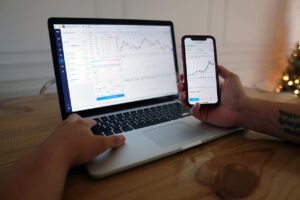By Ankur Shah. Originally published at ValueWalk.

Finding the perfect trading strategy can be a difficult process. After all, there are many kinds of corporations in the market, and research can be time-consuming even for experienced investors. It is imperative to take some time to research the market and how it operates to avoid some common forex trading scams which can negatively impact investors’ returns, budgets, and overall financial well-being.
How do trading scammers lure their victims, and what can you do to avoid being one of them? This article will explore why people fall victim to these criminals and how to avoid forex scams altogether.
Q1 2022 hedge fund letters, conferences and more
Steady Investor Growth
The number of adults in the United States investing in the stock market reached a 10-year high in 2021 at 56%. That is the largest percentage since 2010, which also boasted 56% of the adult population in the States as stock market investors. Stock market engagement dropped to 54% in 2011 and 52% in 2013 and only hit a sustained string of steadily increasing annual percentages in 2017 when the number reached 54%. More people are investing in the stock market each year; in other words, some experts believe the figure is still in slow recovery after the Great Recession but are anticipating further growth.
What does all of this mean? To synthesize the information, the growing percentage of adults investing in the stock market means that more people are wading into the market for the first time every year. Since at least some of those people will be unfamiliar with the risks inherent to the market, this translates to more potential victims of trading scams.
What Are Forex Trading Scams?
Forex trading scams trick people into making fraudulent foreign currency investments. These often take the form of urgent “once in a lifetime” opportunities to benefit from massive growth overnight for a modest buy-in. Once they have received the money from their victims, the scammers often vanish, leaving their targets with nothing.
Before we dive into some of the specific types of scams for which people often fall, we wanted to take a moment to talk about some of the warning signs to keep in mind while trading.
Cold Calls
Are you expecting communication about a potential investment? If not, be wary of any random offers. Scammers can often make these messages seem natural, but that does not mean that they are coming from trustworthy individuals. Pay attention to your online activity and ask yourself if an unexpected offer might be too good to be true.
Claims Of Impossibly High Returns
Online investing is rarely an overnight success story. It takes time to build a portfolio full of the kinds of investments that offer impressive returns. If you receive an offer from someone who promises incredibly high returns, be cautious. Most professional brokers will be honest and reasonable in their claims, so if you run across someone promising you the moon, it might be time to take a break. Always remember to research these claims, too, to see how reasonable they might be.
Common Forex Trading Scams
There are many kinds of forex scams, but some are more prevalent than others. Here are three of the most common scams in the market.
Fake Forex Brokers
One of the most common forex trading scams is the fake forex broker scam. This scam sees criminals pretending to be experienced forex brokers or legitimate investment platforms to trick investors into buying fake forex funds. This is often done using the registration number and name of well-known brokers. Checking the FCA register and using only official contact details listed in the database can help investors avoid this type of scam.
Fake Forex Managed Accounts
Another common type of forex scam is the fake managed account scam. A managed account refers to a fund managed by expert traders on your behalf. This kind of account is a popular option that allows casual investors to trade forex by paying experienced traders to manage it for them. The problem arises when you run into an unscrupulous criminal offering fake managed accounts. This scammer will take your money while pretending to invest it, leaving you with nothing.
Carefully research the financial services and platforms before signing up to avoid this scam. Like the previous point, paying attention to the FCA registration database can help ensure you are using trustworthy contact information for legitimate traders.
Forex Pyramid Schemes
Pyramid schemes seem to be an increasing problem in today’s society, with many different populations falling victim to these dubious “businesses.” Forex is no exception. Forex pyramid schemes are designed to convince investors that they are buying into a low-risk, high-reward forex fund in a bid to convince them to recruit more users (typically family and friends). Once enough people have bought into the pyramid scheme, the scammers disappear with the funds and leave their investors with no returns.
How else can you avoid forex scams? Reading detailed advice from experts can help! Trusted online sources of information such as well-known industry experts committed to offering their readers and clients trustworthy advice about typical and emerging forex fraud schemes can help. Comprehensive guides can help new and experienced investors avoid falling victim to costly scams, too.
Are you interested in forex trading? Do not forget to do some research before you get started! Keep our tips above in mind, and you will be well on your way to making smart investment choices.
Updated on
Sign up for ValueWalk’s free newsletter here.



